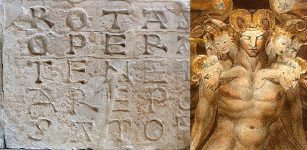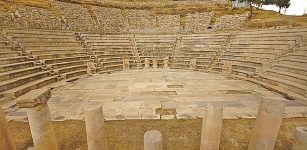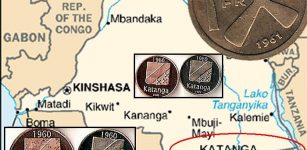Lost Ancient Golden City Of Vineta – The Atlantis Of The North
Ellen Lloyd - AncientPages.com - Many have tried to find the legendary ancient golden city of Vineta, but the place's location remains an unsolved mystery.
Did Vineta really exist, or was it only a mythical city? Do the ancient ruins of Vineta lie hidden somewhere beneath the water of the Baltic Sea?
Ancient stories tell that Vineta was once a prosperous trading center on the Baltic Coast. During the late 12th century, it disappeared beneath the water. Legend tells Vineta's inhabitants ignored omens of a coming disaster, and the city was submerged as punished for moral decay.
Today, Vineta has become known as the Atlantis of the North, and people still go to the beach hoping to catch a glimpse of the ancient underwater city.
Vineta Was A Prosperous Ancient Trading Center
According to legends, Vineta was visited by traders from many corners of the world. It was one of the most important ancient commercial cities in Europe, visited by Vikings, Slavs, Spaniards, Saxons, people from the Mediterranean, and business people from surrounding Baltic regions.
Before Vineta was submerged it was a major trading center. Credit: Adobe Stock - Sophia
The ancient city of Vineta flourished, and news about the town reached people in distant parts of the world. Ibrahim Ibn Yaqub, a 10th-century Hispano-Arabic, Sephardi Jewish traveler, who was probably a merchant and may also have been engaged in diplomacy and espionage, described it as "a large city by the ocean with twelve gates, the greatest of all cities in Europe, farthest northwest in the country of Misiko (Poland) in the marshes by the sea.
It is said that Vineta had a population of at least 50,000 inhabitants, and the city was even more prosperous than Constantinople.
Warnings Of A Coming Disaster Were Ignored
According to legend, three months, three weeks, and three days before the city's destruction, all people were warned of the coming catastrophe. Strange bright lights were seen in the sky, and a wailing mermaid appeared. The water woman cried three times in a high, startling voice:
"Vineta, Vineta, you rieke town, Vineta sall untergahn, wieldse se het väl Böses dahn"
Credit: Adobe Stock - Nejron Photo
"Vineta, Vineta, rich city, Vineta is to be destroyed because she has done much evil."
Even today, bells from the depths of the sea will be heard.
Elders advised everyone to leave the city, but everyone was reluctant to abandon a place famous for its gold and wealth. The inhabitants of Vineta lacked modesty and had become greedy.
The city of Vineta was deluged in 1170 and vanished beneath the waves of the Baltic Sea. It was believed that Vineta had been destroyed as punishment for immorality.
Where Is Vineta – The Atlantis Of The North?
The location of Vineta remains controversial, and there are many disagreements about where the legendary city was situated.
Some researchers have suggested that Vineta may have been on Wolin, an island surrounded by the Baltic Sea to the north and the Dziwna River to the east. Archaeological excavations have revealed that Wolin was once a major Viking trading center.
Jomsvikings were elite warriors who trained at Jomsborg.
Colored copperplate engraving from 1590 by Braun and Hogenberg (which is probably the oldest pictorial depiction of the town Barth. Image credit: Barth Stadt
According to intriguing stories told in the Icelandic Sagas, courageous Norse warriors were based at Jomsborg, a fortress on the south on the southern Baltic shore where Jomsvikings had their headquarters.
Jomsborgs has never been found, and there is insufficient evidence to claim Vineta on the island of Wolin. According to historian Wilhelm Ferdinand Gadebusch, Wolin needed the deep water port Vineta must have had.
Another possible location of Vineta is Usedom. Its nickname is Sunshine Island, and it is located between Germany and Poland in the Baltic. However, there is very little evidence of Slavic habitation in the area, making it unlikely this could have been Vineta. Several maps published between 1633 and 1700 have the sunken "Wineta" east of the island of Ruden northwest of Usedom.
This idea may have originated in the All Saints' Day flood of 1304, to which most of the Ruden and the then-existing connection to Mönchgut on Rügen fell victim.
It has also been speculated that Barth, a medieval town on a lagoon in northeastern Germany, is linked to the legendary golden city of Vineta. Barth was an important trade center during the Middle Ages.
Since 1999, the City of Barth has been allowed to call itself the City of Vineta. Two scientists from Berlin have suggested that Berlin, the "Atlantis of the North," be in the mud of Barth Bodden (Barth lagoon), but it has not been officially confirmed that this is the actual location of Vineta.
Whether the story of the golden city of Vineta is a mere myth or based on actual events can only be determined once the ancient ruins are finally discovered.
Written by Ellen Lloyd - AncientPages.com
Updated on January 2, 2024
Copyright © AncientPages.com All rights reserved. This material may not be published, broadcast, rewritten or redistributed in whole or part without the express written permission of AncientPages.com
Expand for referencesMore From Ancient Pages
-
 Moses’ Secret Knowledge Of Superior And Forbidden Technology – Hundreds Of Chariots Hovering Over Sinai – Part 1
Ancient Mysteries | Sep 21, 2020
Moses’ Secret Knowledge Of Superior And Forbidden Technology – Hundreds Of Chariots Hovering Over Sinai – Part 1
Ancient Mysteries | Sep 21, 2020 -
 Sator Square: Mysterious Ancient Magical Word Puzzle Remains Unsolved
Ancient Symbols | Apr 18, 2018
Sator Square: Mysterious Ancient Magical Word Puzzle Remains Unsolved
Ancient Symbols | Apr 18, 2018 -
 The Phrase Hip Hip Hooray Has Ancient Roots
Ancient History Facts | Jun 6, 2018
The Phrase Hip Hip Hooray Has Ancient Roots
Ancient History Facts | Jun 6, 2018 -
 Sunduki – ‘Home Of The Gods’ – One Of The World’s Oldest Astronomical Observatories
Civilizations | Oct 4, 2015
Sunduki – ‘Home Of The Gods’ – One Of The World’s Oldest Astronomical Observatories
Civilizations | Oct 4, 2015 -
 The Gold Compartment At Habu Temple Looks Magnificent After Restoration
Archaeology | Aug 20, 2022
The Gold Compartment At Habu Temple Looks Magnificent After Restoration
Archaeology | Aug 20, 2022 -
 Mysterious Biblical Celestial City And Its Connection To The North Star – Nonhuman Hands – Part 1
Ancient Mysteries | Feb 22, 2021
Mysterious Biblical Celestial City And Its Connection To The North Star – Nonhuman Hands – Part 1
Ancient Mysteries | Feb 22, 2021 -
 Cult Of Zeus Discovered In The Ancient City Of Metropolis
Archaeology | Dec 21, 2015
Cult Of Zeus Discovered In The Ancient City Of Metropolis
Archaeology | Dec 21, 2015 -
 Zyndram’s Hill: Oldest-Known Stone Wall – A Masterpiece Of Architecture Found In Poland
Civilizations | Sep 15, 2015
Zyndram’s Hill: Oldest-Known Stone Wall – A Masterpiece Of Architecture Found In Poland
Civilizations | Sep 15, 2015 -
 Legendary Minamoto No Tametomo – First Samurai To Commit Seppuku
Ancient History Facts | Aug 7, 2023
Legendary Minamoto No Tametomo – First Samurai To Commit Seppuku
Ancient History Facts | Aug 7, 2023 -
 What Is Pax Sinica?
Ancient History Facts | Apr 26, 2018
What Is Pax Sinica?
Ancient History Facts | Apr 26, 2018 -
 Stunning 3,400-Year-Old Palace Of the Kingdom Of Mitanni Discovered Thanks To Drought
Archaeology | Jun 27, 2019
Stunning 3,400-Year-Old Palace Of the Kingdom Of Mitanni Discovered Thanks To Drought
Archaeology | Jun 27, 2019 -
 Mysterious Chakana – Sacred Inca Cross And Its Connection To The Southern Cross Constellation
Ancient Symbols | Sep 15, 2018
Mysterious Chakana – Sacred Inca Cross And Its Connection To The Southern Cross Constellation
Ancient Symbols | Sep 15, 2018 -
 Triumphal Arch Of Roman Emperor Constantine And His Great Vision
Featured Stories | Jul 12, 2017
Triumphal Arch Of Roman Emperor Constantine And His Great Vision
Featured Stories | Jul 12, 2017 -
 Ensisheim Meteorite Is The Oldest Meteorite With A Precise Date Of Impact
Ancient History Facts | Jun 29, 2018
Ensisheim Meteorite Is The Oldest Meteorite With A Precise Date Of Impact
Ancient History Facts | Jun 29, 2018 -
 Many Samurai Had Swords With Secret Crucifixes And Hidden Christian Symbols To Avoid Persecution
Ancient History Facts | Jan 10, 2017
Many Samurai Had Swords With Secret Crucifixes And Hidden Christian Symbols To Avoid Persecution
Ancient History Facts | Jan 10, 2017 -
 Mysterious Tiahuanaco Empire Established By The Sons Of The Sun – An Unknown Chapter Of Prehistory
Ancient Mysteries | Oct 30, 2018
Mysterious Tiahuanaco Empire Established By The Sons Of The Sun – An Unknown Chapter Of Prehistory
Ancient Mysteries | Oct 30, 2018 -
 Katanga Cross: Symbol Of Secrets, Power And Valuable Currency Of The Congolese People
Ancient Symbols | Sep 10, 2018
Katanga Cross: Symbol Of Secrets, Power And Valuable Currency Of The Congolese People
Ancient Symbols | Sep 10, 2018 -
 What Is The Codex Mendoza?
Ancient History Facts | Feb 14, 2016
What Is The Codex Mendoza?
Ancient History Facts | Feb 14, 2016 -
 Trees Are Deeply Rooted In Beliefs And Cultural Traditions Of Ancient People Around The World
Featured Stories | Feb 18, 2018
Trees Are Deeply Rooted In Beliefs And Cultural Traditions Of Ancient People Around The World
Featured Stories | Feb 18, 2018 -
 Unexplained Mystery In Ohio – Unusual Force Puzzles Scientists
Featured Stories | Dec 21, 2018
Unexplained Mystery In Ohio – Unusual Force Puzzles Scientists
Featured Stories | Dec 21, 2018




